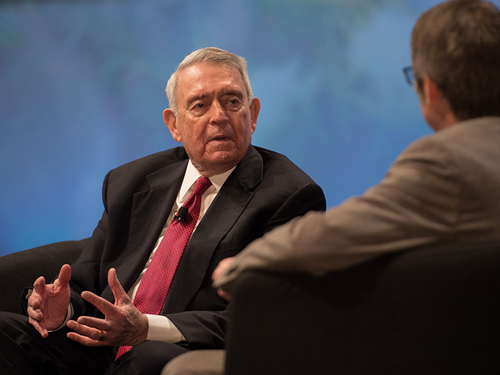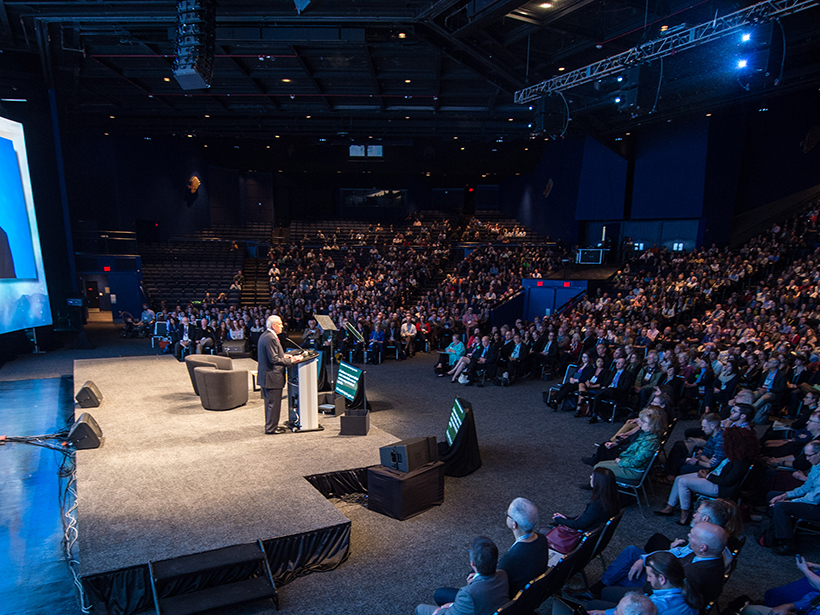“The fate of our very planet is at stake,” renowned journalist Dan Rather told a roomful of scientists yesterday at the American Geophysical Union’s Fall Meeting in New Orleans, La. “Earth is warming; human activity plays a major role. We can, if we act with speed and purpose, likely mitigate some of the harm. But will we?” he asked.
The urgency of the task in today’s charged political environment, the pushback from the Trump administration about fake news as well as its inaction on climate change, and the need for scientists to better communicate their work were among Rather’s themes in his keynote speech. Rather, 86, was a CBS news anchor from 1981 to 2005 and has covered every U.S. president since Dwight Eisenhower. He is a veteran reporter of wars, civil rights, science, and other major news spanning the past 50 years.
From his vantage, Rather sees society at large at a crossroads. “We find ourselves in a moment of reckoning,” he said in his address. “Are we going to guide our future by science, reason, and knowledge, or are we going to succumb to superstition, ignorance, and propaganda?”
Science Under Siege
Currently, the United States faces a unique threat, Rather said, with a president who has told an unprecedented number of easily debunked lies since the very beginning of his term—all the while attacking the press and media and accusing them of publishing “fake news.”
“Journalists and scientists are both under siege…beset by accusations of fake news, self-interest, and bias.”
“Journalists and scientists are both under siege,” Rather said, “beset by accusations of fake news, self-interest, and bias. Much of this comes from coordinated attacks from powerful actors who have a vested interest in the truth remaining hidden.”
During a news briefing that followed his talk, Rather said that “many of the attacks on the whole business of climate change [are] very cynical” because what President Trump is trying to accomplish “is financed by very wealthy special interests whose businesses and products by their calculation might suffer” if climate change became even more widely accepted.
“We can dance around it,” Rather said, but in many instances, public officials “are bought and paid for, and they deliver.”
Rather said at the briefing that Trump “is really preaching the gospel of division” and that his dismissal of climate change as coming from the intellectual elite resonates with Trump’s political base.
Despite the administration’s stance on climate change, Rather said that he is optimistic by nature and by experience and “without apology.”
“That’s not Pollyannaish optimism with me. We are in a very perilous time in this country. This is not normal,” he said. “But there is a fundamental decency and an empathetic core to the people of the United States that when the big chips are on the table—which is to say, when you are absolutely positive we have to do it—then the country responds.”
However, Rather told Eos that there is a sense of urgency to fix these problems. “If [the country] keeps going in the direction that it’s going, I hate to contemplate what would happen. I don’t think that will happen,” he explained. “The country really needs to pull out of this.”
Rediscovering Nuance
So how do we combat anti-intellectual forces? “I want to see a revolution in how we communicate science,” Rather said.
A cynicism toward science and scientists has been brewing for years, he said, because the nuances and individual stories have largely been ignored in the name of splashy results. “I believe this breeds much of the dangers and distrust that we’re witnessing and experiencing today,” Rather said.
Scientists are often criticized for not explaining themselves well enough or for not taking science communication seriously, he noted. But although he hopes the science community embraces communication “with more urgency,” ultimately, scientists’ job is “to be great researchers, to understand data, to dream up ingenious experiments.”
“Much of the story of science is being lost in popular culture.”
Rather then spoke to the science communicators in the room: “What if we confront our biases about what the public might find interesting?” He also asked the scientists in the audience how often they’re told to frame their science in a way they’ll think the public will find interesting. Many in the audience raised their hand, and some scattered laughter could be heard.
“I think you’re getting the wrong advice,” he said. As a result, “much of the story of science is being lost in popular culture.”
What Rather hopes is that scientists and communicators will form a partnership to tell “compelling but also truthful” stories and celebrate the slow, nuanced, roiling debate that encapsulates the scientific process.
“Those of us in the press and media, we’re always looking for easy answers, simple narratives,” Rather said. Instead, he imagines a future in which storytellers can highlight what scientists themselves are passionate about to capture the “joy and awe of discovery” of the scientific process. “We can focus on the journey of discovery as well as the results,” Rather said. And by telling stories about diverse scientists around the world who might not be tenured at prestigious universities, “we can democratize the pursuit of science,” he continued.
Through partnerships in storytelling we can slowly build a culture that values science, Rather explained. And as the founder and CEO of News and Guts, an independent news production company, he wants to do his part to help shape that culture. “I may have only a little bit to offer, but whatever I have to offer, why, I want to try,” he later told Eos.
Fear Not

Getting the public engaged in science is not an onerous task, Rather noted in is address. He pointed out that millions observed the 2017 solar eclipse and that many people visit science museums across the country every year. The public, he said, is knowledge hungry.
When AGU president Eric Davidson later asked Rather his advice for scientists who are reluctant to speak to the media for fear of being misrepresented, Rather’s response was simple: “Fear not.”
“This is not worthy of some of the best minds in the country to talk about risk to say, ‘I’m afraid to do something,’” he continued. “No. The best of science is not afraid to do anything.”
When speaking with the media, “Is there a risk sometimes? Are you going to get burned sometimes?” Rather asked. “Yeah, probably, unless you’re very lucky and very careful.”
But the pursuit of science—and for that matter, life itself—is about taking risks, he explained. “So don’t come into science and science storytelling thinking, ‘What might happen?’ Have some courage, take the risk.”
Shifting the Culture
“I’ve covered enough social movements to know that big change begins with small commitments and engagement.”
To change the paradigm around science communication, Rather urges small, individual acts from scientists—engage with local schools, or even just talk to a relative about your research, he said. Scientific “leaders can’t lead if they don’t have those who can amplify their calls,” he explained.
These actions may seem small and insignificant, but thousands and thousands compounding on each other will have a large effect. “I’ve covered enough social movements to know that big change begins with small commitments and engagement,” Rather said.
See below for a full video of Dan Rather’s 2017 Fall Meeting Presidential Forum lecture.
—JoAnna Wendel (@JoAnnaScience) and Randy Showstack (@RandyShowstack), Staff Writers; and Mohi Kumar, Scientific Content Editor
Citation:
Wendel, J.,Showstack, R., and Kumar, M. (2017), Dan Rather’s vision for scientists in an era of “fake news”, Eos, 98, https://doi.org/10.1029/2017EO088793. Published on 12 December 2017.
Text © 2017. The authors. CC BY-NC-ND 3.0
Except where otherwise noted, images are subject to copyright. Any reuse without express permission from the copyright owner is prohibited.


It’s interesting in that a journalist (not a scientist) is talking to scientist about fake news. He should know. His attempt to pull down President George W. Bush was the epitome of fake news.
How ironic, given Rather’s own involvement with using fake documents about George Bush in a poorly researched fake news story that led to his dismissal from CBS.
I want the New Age of Reason. But as I was watching this the new banned words list at the CDC came out. We have a serious problem before we can get to the New Age of Reason. We are in very real danger right now.
But I do thank Rather for pointing out that the pushback on science includes not only the climate issues but also GMO and vaccines. It’s not one side. It’s a serious problem of not using evidence-based, and science-based, [banned words at CDC] evaluations on many fronts.
Great video but sound not coordinated with video. Thx.